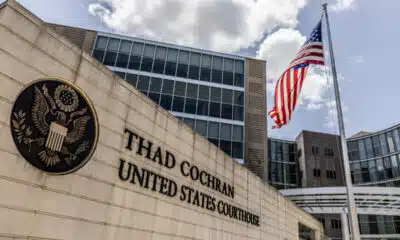Mississippi News
Question in mental health lawsuit has implications beyond Miss.
‘A screeching halt.’ Judges’ question in mental health lawsuit has implications beyond Mississippi
Mississippi’s long-running mental health lawsuit could trigger an upheaval in how legal protections for people with disabilities are enforced, potentially reducing pressure on state and local governments to guarantee disabled Americans equal access to services.
The Department of Justice sued Mississippi six years ago claiming it had violated the Americans with Disabilities Act (ADA) by institutionalizing people with mental illness instead of providing community-based services. A district judge sided with the federal government, approved a remedial order for the Department of Mental Health and appointed a special monitor to oversee the agency’s compliance. The state appealed that ruling last year, arguing that the mental health system had already made improvements and that the district court had wrongly imposed “perpetual federal oversight.”
But the three-judge panel of the U.S. Court of Appeals for the Fifth Circuit that will hear oral arguments in the case Wednesday is interested in a much more fundamental question: whether the Department of Justice could legally have sued Mississippi at all.
If the judges decide the answer is no, that would create a split with another federal appeals court. Then the question could wind up in front of a U.S. Supreme Court that is deeply skeptical of federal authority and willing to overturn long-standing precedents like Roe v. Wade.
For years, federal lawsuits like the one against Mississippi have been the major vehicle pushing state and local governments to offer equal access and services to people with disabilities, which is required under Title II of the ADA.
The panel’s decision to pose a question that neither Mississippi nor the Justice Department raised in their own briefs suggests the judges are interested in changing that.
“The disability community is extremely worried,” said Ira Burnim, legal director at the Bazelon Center for Mental Health Law.
Burnim co-authored an amicus brief by several national organizations advocating for people with disabilities or mental illness. The brief, submitted before the panel raised the question of whether the Justice Department should have been able to sue at all, argued that Mississippi had violated Title II and that oversight was necessary to ensure the state expanded community-based mental health services.
“The Department of Justice’s ability to bring lawsuits is critical to the enforcement of Title II,” he continued.
Accessibility at public buildings like courthouses, accommodations for hearing-impaired people to participate in juries, and wheelchair lifts on public buses are all areas where the Justice Department could sue under Title II.
The law has also been applied more broadly. In the 1999 case Olmstead v. L.C., the Supreme Court ruled that “undue institutionalization” violates Title II because depriving people of the chance to live in their community constitutes discrimination. The Justice Department has relied on that precedent to force states to provide community-based services for people with mental illness.
From 2009 to 2016, the department was involved in 50 such cases, including the Mississippi suit.
The judges assigned to hear the Mississippi case are Edith Jones, James Ho and Leslie Southwick, all Republican appointees to the most conservative appeals court in the country.
The language of Title II does not explicitly say the attorney general can sue state and local governments to enforce it, while other parts of the ADA do. But the Justice Department has initiated lawsuits to enforce Title II since it came into effect in 1992, and it has argued that Congress clearly intended the attorney general to have the authority to compel state and local governments to comply with nondiscrimination law if they won’t do so on a voluntary basis.
If the Fifth Circuit panel determines that the Justice Department could not have sued Mississippi, that ruling would conflict with a recent ruling by the Eleventh Circuit in a Florida lawsuit.
Like the Mississippi case, that federal lawsuit involved claimed Florida was unnecessarily institutionalizing mentally ill or disabled people.
The Eleventh Circuit rejected Florida’s argument that the Justice Department could not sue it directly. Florida then appealed to the Supreme Court, arguing that federal Title II lawsuits can affect “virtually all state and local activities and programs.”
“Through lawsuits brought against states under Title II, the United States has asserted sweeping authority to reshape all manner of state programs, shifting the balance of federal-state power,” the state’s petition said.
The Supreme Court recently declined to hear the Florida case. But if the Fifth Circuit reaches a different conclusion from the Eleventh Circuit, the highest court may step in.
“This is pure speculation, no one knows the reason for the Fifth Circuit action, but one possibility here is that if the Fifth Circuit were to find that DOJ lacked authority to bring lawsuits in federal court to enforce Title II, then there would be a circuit split and it would make it more likely that the Supreme Court would accept a case that raised that issue,” Burnim said.
In addition to the mental health lawsuit, the Department of Justice has pursued legal action against Ocean Springs, Biloxi, Jackson, and other cities and counties to enforce compliance with Title II. In most cases, that action resulted in a settlement agreement rather than a years-long lawsuit.
If the Justice Department were unable to sue states directly, individuals or organizations representing a group of such individuals could still sue. But these lawsuits are time-consuming and expensive, and the Justice Department has the staff, expertise and resources to see them through, said Clarence Sundram, an attorney and expert on institutions and community services for people with mental disabilities.
“Many times private individuals will complain to the DOJ to invoke its assistance in these kinds of cases for precisely these reasons,” said Sundram. “So to rule that DOJ doesn’t have the authority could remove one very significant avenue of enforcing these laws.”
Advocates for Mississippians with mental illness will be watching the case closely, too.
Joy Hogge, executive director of the nonprofit Families As Allies, which advocates for kids with behavioral health challenges, said she has seen “genuinely good things happening” in the state’s mental health system under the remedial order. But all of that has been directly linked to the lawsuit, she said. If the order were overturned – which the Fifth Circuit could do even if it doesn’t reject the Justice Department’s authority to sue states under Title II – she’s not sure progress will continue.
“I’m afraid that everything might just come to a screeching halt,” she said.
The Fifth Circuit website says the court aims to issue opinions within 60 days of oral arguments.
This article first appeared on Mississippi Today and is republished here under a Creative Commons license.
Mississippi News
Events happening this weekend in Mississippi: July 11-13
SUMMARY: From July 11-13, Mississippi offers a variety of events for all ages. In Jackson, enjoy the season finale of “Late Night with Rita Brent,” Disney’s The Lion King, Jr., and exhibitions at the Mississippi Children’s Museum. Pearl hosts the Mississippi Mud Monsters with fireworks and a Back 2 School Bash. Ridgeland features the Wildflower Field, Art Park, Renaissance Christmas in July sales, and a Fairy Garden Workshop. Natchez and Vicksburg offer farmers markets and local entertainment. Hattiesburg presents Po Boy Fest, Clue: The Musical, and outdoor movies. Activities include rodeos, ice cream tastings, run clubs, and community tennis events across the state.
The post Events happening this weekend in Mississippi: July 11-13 appeared first on www.wjtv.com
Mississippi News
Death toll from catastrophic Texas flooding passes 100
SUMMARY: Catastrophic flooding in Texas over the July Fourth weekend killed at least 104 people, including 28 children, mostly near Camp Mystic, a century-old girls’ summer camp in Kerr County. Search-and-rescue teams continue to search swollen rivers for dozens still missing; officials expect the death toll to rise as more rain threatens the saturated area. Many victims were swept from cabins by flash floods early Friday, some clinging to trees. Authorities will investigate warnings and evacuation delays, noting poor cellphone service hindered alerts. Despite warnings issued before the flood, some residents didn’t receive them. President Trump plans to visit the state.
The post Death toll from catastrophic Texas flooding passes 100 appeared first on www.wjtv.com
Mississippi News
LIVE: Officials give updates on Texas floods
SUMMARY: Crews in central Texas continue searching for victims after catastrophic July Fourth weekend flooding killed over 80 people, including 27 campers and counselors at Camp Mystic along the Guadalupe River. The floods, some of the worst in decades, struck overnight, sweeping away tents and cabins. With more rain forecast, authorities warn the death toll may rise as many remain missing. Survivors described clinging to trees or fleeing to attics. Officials face scrutiny over flood warnings and emergency response. President Trump declared Kerr County a disaster area, pledging support while criticizing FEMA’s performance.
The post LIVE: Officials give updates on Texas floods appeared first on www.wjtv.com
-
News from the South - Georgia News Feed7 days ago
'Big Beautiful Bill' already felt at Georgia state parks | FOX 5 News
-
The Center Square5 days ago
Here are the violent criminals Judge Murphy tried to block from deportation | Massachusetts
-
News from the South - Kentucky News Feed5 days ago
Woman arrested in Morgantown McDonald’s parking lot
-
News from the South - Texas News Feed7 days ago
Hill Country flooding: Here’s how to give and receive help
-
News from the South - North Carolina News Feed7 days ago
Raleigh caps Independence Day with fireworks show outside Lenovo Center
-
News from the South - Missouri News Feed7 days ago
Shannon County Sheriff alleges ‘orchestrated campaign of harassment and smear tactics,’ threats to life
-
News from the South - Kentucky News Feed6 days ago
Cruising into Louisville: Viking cruise ship docks downtown on Ohio River
-
Our Mississippi Home7 days ago
The Other Passionflower | Our Mississippi Home

















































